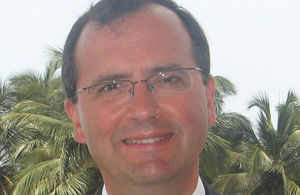Farewell message from British Ambassador to Liberia
British Ambassador to Liberia Fergus Cochrane-Dyet's farewell message.

I shall soon depart Liberia, at the conclusion of my posting here, with happy memories from travels as far afield as Ganta and Zwedru. This has been my thirteenth diplomatic posting and eighth in Africa. Highlights of my career have included attending the Sydney Olympics opening ceremony, and joining brave US Marines on foot-patrol in a southern Afghanistan warzone! In comparing Liberia to those other countries where I have lived and worked, I should like, humbly, to offer a few observations in a spirit of candid friendship.
During two years in Monrovia I am proud to have re-opened the British Embassy, and that the Embassy remained fully operational throughout the terrible Ebola crisis. The UK has contributed $930 m to fighting Ebola, mostly for Sierra Leone. In Liberia we play a supporting role to the effort led by the Government in partnership primarily with the UN and US. The Liberian authorities should be commended for being open to help and advice from the international community, while remaining firmly in charge.
The real credit for the dramatic improvement in the situation, however, lies with ordinary people. Back in the grim days of August and September, I often heard it said that general distrust for authority would make community mobilisation all but impossible. This assessment proved wrong. County health teams, community leaders, and ordinary Liberians did a wonderful job, which goes to show that part of the country’s social fabric is strong.
For Liberia’s post-Ebola recovery, economic development will be crucial along with improved healthcare - among many other needs. In addition, though, all post-conflict countries need to tackle the structural inequalities and power relations that caused their wars in the first place. Liberia is not the same country that it was thirty years ago. For example, Liberia’s elite has become more diverse. But I wonder if enough has really changed?
One litmus test is corruption. Her Excellency the President has been admirably vocal on the subject ever since her inauguration address. The President recently called corruption a “vampire of development” and wants the Anti-Corruption Commission to have necessary powers and capacity. Meanwhile, corruption remains deeply entrenched and feeds from a sense of entitlement. Although the Executive take a lot of flak about this, my impression is that a major problem lies with the Legislature and Judiciary. At present there is a sense of impunity. The fight against corruption cannot succeed until “big fish” are successfully prosecuted and locked up - demonstrating that no one is beyond the reach of the law.
Another test is the degree of trust between governed and the governing known as the social contract. Working elsewhere in Africa, I have observed rampant corruption, but also elites that were emotionally and physically rooted in their own country. Support from the world’s superpower and its Liberian diaspora can be hugely beneficial. But straddling an ocean has invidious effects as well. On the one hand, it is important that “returnees” base their families here, rear their children here, invest their money here – in commercial farms, factories, and businesses that employ Liberians and generate wealth for the whole country. Equally, though, other Liberians must be welcoming and understanding so as to reassure “returnees” that Liberia can offer them a permanent home. Building trust is fundamental to Liberia’s future.
Returning to the theme of impunity, it is striking how little has been done to prosecute wartime atrocities, even when there is brazen video of the crimes. Under a truth and reconciliation process punishment is not everything, but has its place. Elsewhere in Africa, in Rwanda and Sierra Leone, at least some war criminals have been brought to account. The international community can help by prosecuting Liberian war criminals overseas. Yet, so far, no one has been convicted of war crimes inside Liberia itself. Some say Liberians want to let “bygones be bygones”, although others doubt that the voices of victims and their families have been properly heard. Brushing the past under the carpet may help short-term stability. But is that sustainable? What does it mean for Liberia’s national identity, its soul?
The European Union is one of Liberia’s largest donors. The UK provides a significant amount of that support. Our contribution, like that of other European countries, comes from our taxpayers, many of them hardworking individuals coping with economic difficulties. Normally, as an integral part of the EU’s partnership with the country concerned, there is a political dialogue with the host government during which the EU and member states have an opportunity to discuss issues (like the ones mentioned in this article). There has been but a single dialogue meeting with the government over the past two years; I am glad the dialogue will recommence next month.
The British Embassy, under my successor, will continue to support Liberia’s development using UK aid and assisting UK companies to invest. Liberia has considerable assets with its natural resources, youthful population, and US-trained expertise. The President and her Government are on course to bequeath a legacy of consolidating democracy and, by 2017, almost 15 years of security. I shall always be an advocate for Liberia and will watch the country’s progress with great interest.
Farewell and God Bless Liberia.
Fergus Cochrane-Dyet